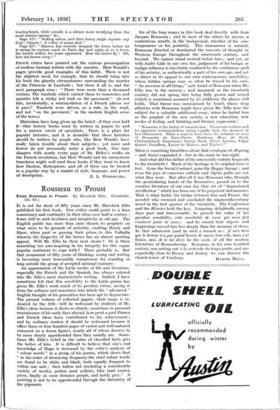Rousseau to Proust
IT is not far short of fifty years since Mr. Havelock Ellis published his first book. Few critics could point to a finer consistency and continuity in their ideas over half a century : fewer still tia such liveliness and receptivity in old age. The English public has more than once chosen its prophets on what seem to be grounds of seniority, exalting Hardy and Shaw, when past or passing their prime, to this Valhalla wherein the longevity of the heroes has an almost sporting appeal. Will Mr. Ellis be their next choice ? Or is there something too awe-inspiring in his integrity for this vague popular sentiment to cope with ? There probably is. But that monument of fifty years of thinking, seeing and writing is becoming more honourably conspicuous for standing so long outside the group of accepted national statuary.
An appreciation of the Latin modes of life and literature, especially the French and the Spanish, has always entered into Mr. Ellis's most characteristic writing. Indeed, I have sometimes felt that this sensibility to the Latin genius has given Mr. Ellis's work much of its peculiar virtue, saving it from the softness and muzziness into which the " advanced " English thought of his generation has been apt to degenerate. The present volume of collected papers—their range is in- dicated by the title—will be welcomed by students of Mr. Ellis's ideas because it shows so clearly, sometimes in personal reminiscence of his early days abroad, how great a part France and French ideas have contributed to his achievement ; and by ordinary readers it should, be welcomed because it offers three or four hundred pages of varied and well-matured comment on a dozen figures, nearly all of whom deserve to be more clearly apprehended then they usually are. Some- times. Mr. Ellis's belief in the value of classified facts gets the better of him. It is difficult to believe that one's real knowledge of Hugo is increased by the critic's analysis of " colour words " in a group of his poems, which shows that " in the order of decreasing frequency the chief colour words are found to be white and black, both equally frequent to within one unit ; then follow red (including a considerable variety of words), golden (and yellow), . blue (and azure), green, finally at some distance purple, and lastly grey." A painting is not to be apprehended through the chemistry of
the pigmenti. z Six of the long essays in this book deal directly with Jean Jacques Rousseau ; and in most of the others he moves, a contentious wraith, in the background, whether of his con- temporaries or his posterity. This immanence is natural. Rousseau directed or dominated the currents of thought in
Western. Europe throughout the nineteenth century, and beyond. We cannot stand neutral before him ; and yet, as with Andre Gide in our own day, judgement of his benign or
malign influence is inevitably confused by the continuous spell of his artistry, so authentically a part of his own age, and yet so direct in its appeal to our own contemporary sensibility,
whose hidden springs may so often be traced to his own. " An ancestor in all things," said Amiel of Rousseau when Mr. Ellis was in the nursery ; and inasmuch as the twentieth century did not spring into being fully grown and armed (which is sometimes assumed by its children), the phrase still
holds. That theme was summarised by Amid, whose deep affinities with Rousseau might have given Mr. Ellis here the subject for a valuable additional essay, when he hailed hint as the prophet of the new society, a new education, new modes of feeling, and thinking and literary expression :
" Rousseau is the father of romanticism. Temperate realism and its opponent sentimentalism spring equally from the dreamer of Les Charmettes. What a man to have been the initiator at once of Bernardin de Saint-Pierre, Miraboau, Mine. do Stab!, Chateaubriand, Lamennais, Georg() Sand, Pierre Leroux, Edgar Quinet, Proudhon, Xavier de Maistro, and Topfor 1"
There is something breathless about that catalogue of offspring —and Amiel expanded it—but in the main he was right.
And what did this father of the nineteenth century bequeath to the twentieth ? Much of the heritage in its original form is lost. Gone the Social Contract, gone the Happy Savage ; and even the joys of conscious solitude and Alpine paths are not what they were. But after all it was Rousseau who, through the gesticulating hands of the Romantics, passed on to the creative literature of our own day that art of " impassioned recollection " which has been one of its prepotent instruments. That is what builds the bridge between him and Proust, the
novelist who crowned and concluded the nincteenth-century novel in the first quarter of the twentieth. The Confessions and the Reveries hold the key. Lingering delightedly among days past and irrecoverable, lie proved the value of his peculiar sensibility, cells sensibilite de coeur qui tons fait .raiment jouir de nous ; and he owned that objects and happenings moved him less deeply than the memory of them.
In that admission (and in such a remark as : je sais bier: que Is lecteur tea pas grand besoin de savoir lout cela, mais j'ai besoin, moi, de k lui dire) lie the seeds of all the modern Literature of ReMembering. Rousseau, in his own troubled century, was setting out er /a recherche du temps perdu, and un-
expectedly close to Bossey and Mutely we can discern the














































 Previous page
Previous page